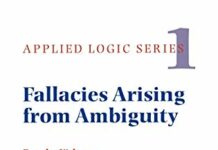
Ebook Info
- Published: 2016
- Number of pages: 338 pages
- Format: PDF
- File Size: 4.95 MB
- Authors: Douglas Walton
Description
A vital contribution to legal theory and media and civic discourseIn the 1860s, northern newspapers attacked Abraham Lincoln’s policies by attacking his character, using the terms “drunk,” “baboon,” “too slow,” “foolish,” and “dishonest.” Political argumentation has steadily increased since then and the argumentum ad hominem, or personal attack argument, has now been carefully refined as an instrument of “oppo tactics” and “going negative” by the public relations experts who design political campaigns at the national level. In this definitive treatment of one of the most important concepts in argumentation theory and informal logic, Douglas Walton presents a normative framework for identifying and evaluating ad hominem or personal attack arguments. Personal attack arguments have often proved to be so effective, in election campaigns, for example, that even while condemning them, politicians have not stopped using them. In the media, in the courtroom, and in everyday confrontation, ad hominem arguments are easy to put forward as accusations, are difficult to refute, and often have an extremely powerful effect on persuading an audience. Walton gives a clear method for analyzing and evaluating cases of ad hominem arguments found in everyday argumentation. His analysis classifies the ad hominem argument into five clearly defined subtypes—abusive (direct), circumstantial, bias, “poisoning the well,” and tu quoque (“you’re just as bad”) arguments—and gives methods for evaluating each type. Each subtype is given a well-defined form as a recognizable type of argument. The numerous case studies show in concrete terms many practical aspects of how to use textual evidence to identify and analyze fallacies and to evaluate argumentation as fallacious or not in particular cases.
User’s Reviews
Reviews from Amazon users which were colected at the time this book was published on the website:
⭐”Catharsis” is a noun that can be applied to anything Douglas Walton writes – his numerous treatises on informal logic, particularly on traditional “informal” fallacies, provide a refreshing intellectual catharsis. Like solving Rubik’s cube.Douglas Walton may be the most prolific – and astute – writer in the world today in the field of logic, or informal logic. He has written a number of individual treatises on individual “informal” fallacies, of which this book is a prominent example.The ad hominem fallacy may be the most popular and well-known of all of the traditional “informal” fallacies, or at least my impression is that it is the “informal” fallacy which is the most written about in the academic literature and elsewhere. Perhaps the most well known example of ad hominem attacks – seemingly of the “abusive” subtype – are widely acknowledged as being widely-employed by political operatives in the U.S. political system, as in the infamous and ubiquitous “personal attack ads” employed during campaign season in political elections.The value of this book is probably best explained in this book’s Chapter Two, “The Textbook Treatment” – which critiques the sufficiency of current (as well as previous) logic textbook treatments of informal fallacies, which I know from personal experience are grotesquely inadequate. As with Douglas Walton’s numerous other treatises on “informal” fallacies, his AD HOMINEM ARGUMENTS goes far to to bring (a radicalizing?) comprehensive and uniform treatment and modern understanding to this, perhaps the most well-known of all of the traditional “informal” fallacies. Criticism of “logic textbook treatment” is a constant – and highly welcome – refrain in most of Douglas Walton’s treatises on informal logic.I have hardbound editions of at least twenty different Douglas Walton books on informal logic (all obtained through, and thanks to, AMAZON.com – whose web site identified them for me) and, in terms of publication, AD HOMINEM ARGUMENTS is my choice as the most beautifully produced. Both AD HOMINEM ARGUMENTS and Douglas Walton’s ABDUCTIVE REASONING are published to the highest quality standards, with high quality materials, and with stitched binding, by the The University of Alabama Press, which is to be congratulated on their publishing quality of these two particular University of Alabama Press Books.
⭐A frequent tactic used in arguments is a personal attack against opponents (traditionally called “ad hominem” attacks). Traditionally, such personal attacks generally have been labeled as logical fallacies and deemed inappropriate and irrelevant. This book examines the traditional views about personal attacks, acknowledges that personal attacks are often misused, but challenges the conclusion that personal attacks are always inappropriate and irrelevant kinds of argument.The author analyzes traditional views on personal attacks, identifies their similarities and differences, and assesses their strengths and weaknesses. Using examples and concepts from argumentation theory, informal logic, and Aristotle’s rhetorical theory, the author proposes a schematic approach for identifying, classifying, analyzing, and evaluating different types of personal attack. The author proposes a way to classify various types and subtypes of personal attack to better analyze and evaluate such arguments in the particular contexts and situations in which they occur.Some readers may find controversial the author’s position that personal attacks may be appropriate and relevant arguments under some circumstances. But, readers who carefully follow the author’s discussion of the nature, weaknesses, and limitations of personal attacks may find the author’s position to be not so controversial after all.The author’s approach is methodical and thoughtful. The author’s observations and conclusions are often insightful and thought-provoking. One relatively minor flaw with the book is the author’s occasional lapse into redundant argument, or belaboring a point that he’s made.The book could be of interest to persons trained in, or studying, philosophy, theology, ethics, or law. Anyone interested in learning how to better understand, analyze and evaluate arguments that invoke personal attacks against opponents should consider reading this book. But, the book’s technical nature limits its potential readership. Because of the technical nature of the author’s analysis, some prior exposure to philosophical analysis, moral or theological reasoning, legal reasoning, informal logic, or argumentation theory would be helpful to the reader.
Keywords
Free Download Ad Hominem Arguments (Studies in Rhetoric and Communication) in PDF format
Ad Hominem Arguments (Studies in Rhetoric and Communication) PDF Free Download
Download Ad Hominem Arguments (Studies in Rhetoric and Communication) 2016 PDF Free
Ad Hominem Arguments (Studies in Rhetoric and Communication) 2016 PDF Free Download
Download Ad Hominem Arguments (Studies in Rhetoric and Communication) PDF
Free Download Ebook Ad Hominem Arguments (Studies in Rhetoric and Communication)





